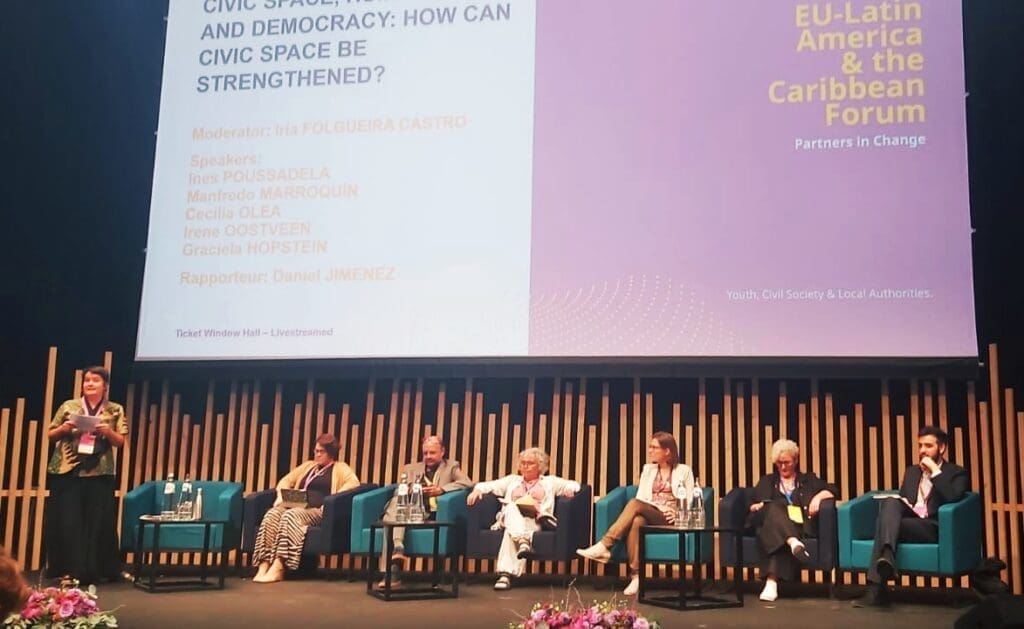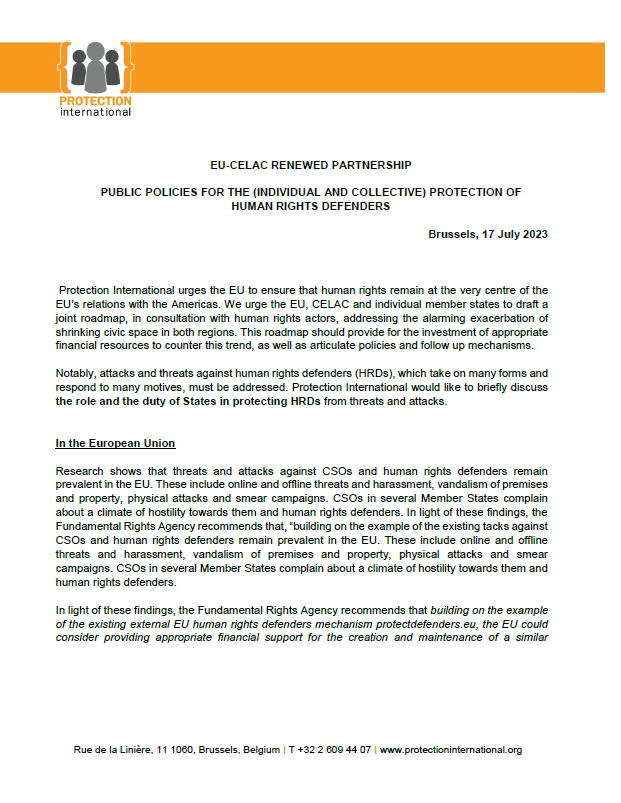Brussels, 17 July 2023
Protection International urges the EU to ensure that human rights remain at the very center of the EU’s relations with the Americas. We urge the EU, CELAC, and individual member states to draft a joint roadmap, in consultation with human rights actors, addressing the alarming exacerbation of shrinking civic space in both regions. This roadmap should provide for the investment of appropriate financial resources to counter this trend, as well as articulate policies and follow-up mechanisms.
Notably, attacks and threats against human rights defenders (HRDs), which take on many forms and respond to many motives, must be addressed. Protection International would like to briefly discuss the role and the duty of States in protecting HRDs from threats and attacks.
In the European Union
Research shows that threats and attacks against CSOs and human rights defenders remain prevalent in the EU. These include online and offline threats and harassment, vandalism of premises and property, physical attacks, and smear campaigns. CSOs in several Member States complain about a climate of hostility towards them and human rights defenders. In light of these findings, the Fundamental Rights Agency recommends that “building on the example of the existing tacks against CSOs and human rights defenders remain prevalent in the EU. These include online and offline threats and harassment, vandalism of premises and property, physical attacks, and smear campaigns. CSOs in several Member States complain about a climate of hostility towards them and human rights defenders.
In light of these findings, the Fundamental Rights Agency recommends that building on the example of the existing external EU human rights defenders mechanism protectdefenders.eu, the EU could consider providing appropriate financial support for the creation and maintenance of a similar monitoring mechanism in the EU, allowing CSOs and human rights defenders to report attacks, register alerts, map trends and provide timely and targeted support to victims.[1]
In addition, several civil society actors have been calling for an EU directive on the protection of HRDs. Such a directive should outline the ways in which HRDs from outside the EU could be supported and protected, both when attempting to access the EU and when staying in the EU, and the different types of support they would need to continue their human rights work. Such a legal tool should also, where relevant, discuss the specific support needs of HRDs from within the EU.
In Latin America and the Caribbean
South and Mesoamerica were pioneer regions for the design and implementation of public policies for the protection of HRDs. The first protection program in the world started in Colombia in 1997, one year before the adoption of the Declaration on Human Rights Defenders by the UN General Assembly. The first national law on the protection of HRDs was also adopted in the region, in Mexico in 2012.
In addition to pressure from civil society organizations, the standard-setting role of the Inter-American human rights system played a huge role in the creation and implementation of protection policies in Latin America. Notably, the Inter-American Court of Human Rights stipulated the obligation of states to protect HRDs through four specific duties:
- Facilitate the necessary means for human rights defenders to freely carry out their activities;
- Protect them when they are subject to threats, in order to prevent attacks on their life and integrity;
- Refrain from imposing obstacles that hinder the performance of their work;
- Seriously and effectively investigate violations committed against them.
Furthermore, the Court explicitly ordered states to create public policies for the protection of HRDs in three judgments – towards Guatemala, Honduras, and Nicaragua. It is also noteworthy that the Inter-American Commission on Human Rights (IACHR) pointed out the need for American states to take into account a series of parameters to develop a “global protection policy”, that would go beyond “restricting themselves, for example, to providing security schemes to defenders at risk without investigating the origin of the threats to which they have been subjected“.
As of today, Mexico, Honduras, and Peru all have laws on the protection of HRDs. As for Brazil, Colombia, and Ecuador, they have adopted either national or sub-national decrees or regulations on the topic. Debates have stalled in El Salvador and Guatemala (I/A Court H.R. Judgment), while there were previous debates, not taken up at present in Paraguay (recent sentence of the IACHR to establish a protection policy for journalists) and Nicaragua (IACHR Court judgment).
Recommendations for EU and CELAC countries
Protection International’s analysis points to the urgent need for State action towards the protection of defenders, whether they act individually or collectively. In particular, we recommend the following:
- Enlarge the current focus on reactive security (e.g. providing bulletproof vests and armed escorts to HRDs) towards building a safe and enabling environment for the exercise of the right to defend rights through enabling legislation, policies, norms, and positive narratives;
- Address the implementation and compliance gap of these policies, i.e. the difference between the objectives of a public policy and its concrete results. This is a complex problem that merits further analysis and close monitoring, for which, in addition to resources, political will, cohesion between law and policies, and compliance and sanctions are essential;
- Address the authorities’ lack of understanding and subjective interpretation of obligations. In many countries, authorities display a lack of awareness of their obligations and/or a negative attitude towards HRDs. It is essential to ensure that authorities are both able and willing to push for positive change and to adopt a protection-oriented and human rights-based approach;
- Train officials and other key stakeholders on how to adopt an HRD-centred approach to protection. For national policies, a more sophisticated understanding of what aspects of protection work for each individual defender or group of HRDs is needed;
- Advanced understanding (through systematization and applied research) of what works best for which groups of HRDs, including diverse groups of human rights defenders in all discussions on their protection; and
- Develop and implement evaluation and learning tools to measure the outcomes and identify the milestones of protection policies, and capture learnings (including failures/challenges to improve on and successes/opportunities to capture and mirror).
- Schedule regular exchanges between the two regions to share experiences, lessons learned and best protection practices.
We would like to emphasize that it is also essential that States with existing protection policies invest and allocate financial resources geared towards the implementation and monitoring of these policies by expert committees. In several countries of Latin America, budget cuts to mechanisms for the protection of defenders have greatly affected the capacity of these mechanisms to effectively assist defenders at risk. Further to this, protection mechanisms should be accessible to anyone who exercises their right to defend human rights, and it is the States’ responsibility to put in place measures to ensure the accessibility of protection mechanisms to marginalized defenders and/or defenders placed in vulnerable situations.
Finally, both EU and CELAC states should establish an effective, constructive, and open dialogue with civil society to jointly monitor that recommendations issued at the regional or international levels on the creation of an enabling environment and the protection of HRDs are reflected in their national legal frameworks.
[1] FRA report (pages 9 – 10) – https://fra.europa.eu/sites/default/files/fra_uploads/fra-2022-protecting-civic-space-key-findings_en.pdf



 English
English